- Home
- William Miller
Gloucester Crescent Page 13
Gloucester Crescent Read online
Page 13
The changeover day also gave me the interesting opportunity of seeing Freddie and Hylan together for the first time ever. What surprised me most was how nice they were to each other, but it did make me wonder how Dee could have been in love with two such different men. Those differences became more obvious as the day wore on. By the afternoon Freddie was dressed for the beach like a character from It Ain’t Half Hot Mum – khaki shorts pulled up over his stomach, a cotton shirt and long grey socks. In stark contrast, Hylan had changed into his travel wear for the overnight train, which was a light brown suede suit with tassels on the arms and knee-high black boots. As he walked to the car, Nick burst out laughing and told him he looked like the black sheriff from Blazing Saddles, which he didn’t seem to mind at all.
On the overnight sleeper to Calais I had one last chance to see Dee at her best before heading off to join my family in Scotland. Sharing a six-berth couchette with an elderly French couple, the heat and smell of sweaty bodies in the compartment was awful. The French couple, who were worried about suffocating, wanted the door left open to let some fresh air in. Dee, however, was worried someone would steal all our luggage and wanted the door closed and locked. In the middle of the night I was woken by a lot of shouting and saw the French couple trying to pull the door open and Dee trying to push it shut.
‘Non, fermez la porte,’ said Dee, then ‘Goddam it, let go!’
‘Non, s’il vous plaît, madame.’
‘Let me shut the fucking door!’
‘Non, madame, arrêtez, s’il vous plaît.’
Then Dee finally exploded, ‘Oh Jesus H Fucking Christ. Do you think the Americans went to all that trouble to save your sorry asses in the war so you could treat us like this? Let me shut the goddamn door.’
The old man said something back to Dee that I hadn’t learned at school, and it was Hylan, as usual, who had to step in and calm everyone down. Still wearing his sheriff’s outfit, it really was like a scene from Blazing Saddles. I think the problem was that Dee always felt certain types of French people owed her one. This might have had something to do with the fact that she believed Freddie had been personally responsible for the liberation of France in 1944. The truth was that Freddie had been posted to Paris as an SOE officer just after the liberation. He hadn’t been part of the liberation itself but had instead cruised around Paris in a chauffeur-driven Bugatti with an army radio installed so he could report back on how it was all going. From what Dad told me, Freddie spent most of his time drinking champagne, chasing women and hobnobbing with other philosophers in a place called the Café de Flore.
Exhausted, we arrived back in London the next day with plenty of time for me to catch the overnight sleeper to Scotland that evening. As a parting treat, and perhaps to make up for being so mean, Dee took me to Bayswater for a Chinese meal and a trip to the American Food Store on Queensway. She then put me on the Inverness train as I hauled a lifetime’s supply of Marshmallow Fluff, Kool-Aid and Lucky Charms breakfast cereal into my sleeper compartment and settled down in my bunk. As I was rocked to sleep by the rhythm of the train, I breathed a sigh of relief knowing I was on my way to the Old Manse, where I wouldn’t be undermined or have my confidence kicked into the dirt by bullies like Nick or the gangs at school.
19
THE MAN FROM THE BBC
From my bedroom window on the top floor of the Old Manse I can see all the way to the end of the Green Road. It’s exactly one mile long and goes from the village war memorial to the bottom of a hill before turning off towards the River Spey. The Green Road is so straight you’d think it had been built by the Romans, but it means you can see any car approaching the village long before it arrives. This is something I’ve done many times when I’ve been excited about the arrival of a visitor. On this occasion the whole house was excited about the arrival of a man from the BBC. He was flying up from London to see Dad and talk to him about making a television series that he claimed could change his life. Apart from the time Dad had gone back to London on the same day we’d arrived, no one had ever come all the way from London just for the day, so it must have been a big thing.
‘I can see him, he’s nearly here!’ I yelled as soon as I saw the white taxi turning the corner onto the Green Road. ‘Five minutes at most!’
I raced down the stairs and burst into the kitchen, where Mum had already started making the coffee. From the kitchen window I could see the taxi coming through the square and pulling up outside our gate. A man with messy black hair and thick-rimmed glasses got out, walked up the garden path and knocked on the front door. He was carrying a briefcase and was dressed like someone who’d clearly come from an office. Dad took him straight into the kitchen and shut the door. They were in there for hours, and when they finally came out they both looked really pleased and asked us to join them for a walk. They carried on talking about what Dad wanted to do in this television series and the things that interested him. The man with the glasses seemed just as enthusiastic as Dad.
The Green Road, Archiestown
As soon as the taxi headed back down the Green Road, Dad started telling us what they’d talked about. He started by saying how there had been only two big and important series on television: Civilisation, with a man called Kenneth Something-or-Other, and The Ascent of Man, with a man Dad liked, called Dr Bronowski. I remembered this man because he had a strong Polish accent and Dad sometimes mimicked him when he was explaining how something worked or had been built in a particular way. The series the BBC wanted Dad to do was to be called The Body in Question, and it was going to be as big and important as Civilisation and The Ascent of Man. Dad was so chuffed, and said that after all these years of doing work he called ‘fatuous and loathsome’ he was finally being asked to do something serious that he could feel proud of. It would be something where he could, in a way, go back to medicine and at the same time teach people about everything he had loved about being a doctor and talk about what he knew about the human body. The man from the BBC said it would be the biggest science project the BBC had ever made and would be seen all over the world.
Soon after the BBC man left, Nick and Caroline Garland arrived with their two children, Alexander and Theo. The Garlands are Mum and Dad’s closest friends and come to stay with us every year. Dad is always happy to be in Scotland when Nick is there because they’re best friends and they can talk together about their lives, which is something I think Dad needs to do. His life might have been quite different if he’d had a brother to compete with and – like Tom does with me – tell him when he’s being an idiot. Nick is probably the closest he’ll ever get to having a brother, and when he’s around it makes a big difference to Dad’s mood and outlook on pretty much everything. He’s one of the few people who can bring Dad round from whatever’s making him unhappy and get him to see all the positive things in his life. The most important thing is that Nick and Dad make each other laugh.
Dad basically thinks his life has been a total waste of time. According to him, everything he’s done has amounted to nothing, which I’ve never understood because I don’t know anyone else’s dad who’s done as much mine. And it doesn’t matter how many times everyone tells him this, he still falls into these depressions and then finds it hard to get out of them. He does in the end, but getting there can be hard on all of us, especially Mum. She says it often starts in the middle of the night, when he wakes her up to tell her how his life has been worthless. At other times it’s because he doesn’t like what he’s working on and wants to get out of it and feels trapped. Someone told Mum it could be something to do with his blood sugar, which might get low in the middle of the night. So she bought a fancy box to go by his bed and filled it with his favourite biscuits. That didn’t work, but what usually does is his having Nick Garland around.
Dad and Nick Garland, Scotland, 1976
Dad told Nick about his big new television series and how making it was going to be like having a magic carpet. All he would have to say is, ‘Do you know, there
’s a fascinating tribe in Africa with a witch doctor?’ and whoosh, off they’d go to Africa to meet the tribe. He might mention an important painting of a man having his leg chopped off by surgeons, which happens to be in a museum in Italy, and whoosh again, off they’d go to Italy. Nick, like all of us, only wants Dad to be happy – and for the first time in ages it really seemed like he was. For the rest of the holiday it was like he was on some kind of happy pill, and it felt as if the sun shone brighter every day.
Dad playing Dr Bronowski, with me, Duffus Castle, Moray
A lot of the time, when Nick and Dad are together, it’s like watching a comedy sketch unfold in front of you. On a trip to the beach that summer we stopped off to look at a ruined castle. All that was left of it were the walls, and you could see the empty doorways on the upper floors that now led nowhere. Dad started climbing over the ramparts and then disappeared. We were worried he might have fallen down a gap between the walls and everyone started searching for him. Then he suddenly reappeared in one of the doorways on the first floor, where there had once been a staircase. Looking out over the ruins he started telling us, in a Polish accent like Dr Bronowski, how the castle had been built before the invention of stairs, which made life very difficult for its occupants.
Always, within days of the Garlands returning to London, a big fat envelope turns up in the post. Inside the envelope is a letter from Nick made up of ten or more pages of thin white drawing paper. Nick is a cartoonist for a newspaper and writes these brilliant letters filled with cartoon scenes from the holiday.
Garland car being repaired in Scotland after a crash
The Garland family returning from Scotland without their car
The Garlands and the Millers
Because Dad was in Beyond the Fringe some people only seem to know him for being a comedian and actor, so I often get asked what it’s like living with a joker. They say things like ‘It must be a right laugh all the time at your house!’ I don’t know why they think comedians spend all day telling jokes. I know Dad can be funny but he’s never ‘comedy funny’, like the Goodies or Monty Python. We have a record of Beyond the Fringe at home, which Tom and I tried to listen to and pretended to laugh at, but we didn’t really get the jokes and it just sounded very old-fashioned. I suppose it didn’t help that we couldn’t see what they were doing on stage.
Dad doesn’t want to be known for being funny; he wants everyone to see him as a serious person with serious thoughts and ideas. He says he was so happy when he was a doctor, and that he would have been a really good one had he stuck at it. He’d done lots of comedy shows at university, and when he was at medical school someone asked him to come to the Edinburgh Festival and be in a sketch show for two weeks. He thought he could take a short break and be back in London, working as a doctor, before anyone noticed. That show was Beyond the Fringe, and he never went back to being a doctor ever again. He said it was as if he’d been tricked into going through a door that was slammed shut behind him and he was trapped on a stage and never allowed to go back to what he really loved. He says he’s been trying to find the key to that door ever since. Now he’d been given this series for the BBC, it was clear that The Body in Question was his chance to go back through that door.
I think Dad likes making people laugh because he loves having an audience, especially when he tells one of his mad jokes. They’re nothing like the ones I know, as his are all quite complicated and hard to remember. When I tell him one of my jokes, he doesn’t even try to laugh. He just sighs and says, ‘You do know why that joke isn’t funny, don’t you?’ Then he starts explaining in detail exactly what makes a joke funny, and then ends up telling his ‘Skinner and Tupper’ joke as an example. Alan must have heard that one a hundred times but it still makes him laugh. He has this deal with Dad that, when one of them dies, the other has to tell this joke at their funeral. I know why the ‘Skinner and Tupper’ joke is funny: it’s about someone who is given a joke to tell, which he then can’t remember and gets completely wrong and it ends up being really rude, and that’s what’s funny about it. So, basically, it’s about how not to tell a joke. So Dad tells it for two reasons: to make you laugh and to show you why you should never tell jokes unless you’re very good at them. He warned me that if I ever tried telling any of his jokes I would hear him in my head screaming, ‘For Christ’s sake, don’t tell that joke!’
I’ve only once broken Dad’s golden rule. It was with Simon Elms’s mum and dad, when I went for supper. Dad was right and I wished straight away that I’d listened to him. As I was telling the joke it was as if he was at the back of the room staring at me and shouting, ‘Stop now before you make a complete fool of yourself!’ I didn’t stop, and just as Dad had warned me – I even got the punchline wrong. Simon’s mum and dad didn’t laugh, and we all sat there in excruciating silence for what seemed like ages.
I did actually meet some real comedians a few years ago when Dad did a show called The Secret Policeman’s Ball, which John Cleese had asked him to direct and perform in. It was for charity and had all these famous comedians doing their best sketches for three nights in a West End theatre. Monty Python were there, as well as the Goodies along with Beyond the Fringe and others like Eleanor Bron, John Bird and John Fortune. Barry Humphries was in it as well. He was doing another show in the West End and had to walk from the other theatre to do his sketch still dressed as Dame Edna.
Dad, Alan and Peter Cook rehearsed their sketches from Beyond the Fringe in our sitting room at Gloucester Crescent. Terry Jones and John Cleese from Monty Python came too, because Dudley Moore was in America and they were standing in for him in two of the sketches. Mum and Dad’s friend Roger Graef was making a television programme about the whole thing, so there was also a film crew. And I was allowed to sit and watch them rehearse. It was pretty crowded. Seeing them all work together was when I first realised how hard it is to be properly funny. They didn’t just come up with a joke and tell it. They spent ages discussing each line, how they’d act it out and then dissecting the jokes and working on them until the whole thing was perfect. They also did quite a bit of sitting around chatting and laughing about the old days. I am used to seeing Alan and Dad together, but it was strange to see them actually working together like they would have done before I was born. They were good together, so I was surprised when Alan asked Terry Jones how Monty Python had managed to stay together for so long and then casually told him that he didn’t think he could ever work with Dad again. I thought this was sad, especially as they’re such good friends, but then maybe that’s why.
The Secret Policeman’s Ball was the first time I’d ever seen Dad on stage, and he was brilliant. I felt so proud of him as he was so funny and, as it turned out, a really good actor too. I realised it was likely to be the first and only time I’d ever get to see him perform sketches from Beyond the Fringe – and this time I got the jokes. They did one I really liked called
The original 1961 Beyond the Fringe sketch ‘So That’s The Way You Like It’: Jonathan Miller, Peter Cook, Dudley Moore and Alan Bennett
‘So That’s The Way You Like It’, based on Shakespeare. The four come on wearing these mad medieval hats and speaking in a silly rhyming Shakespearian way. Terry Jones had a bit where he sings to Alan with a violin. He’d borrowed my violin for the sketch and plucked it very badly while singing like a whining cat. I was impressed by the way Dad was still able to remember all his lines. There’s a bit where he has to say them very fast without pausing and then finishes off with
I most royally shall now to bed,
To sleep off all the nonsense I’ve just said
which made me really laugh. Peter was drunk on the night and had trouble remembering his lines, but he was still very funny and it didn’t seem to put the others off. Dad did his philosophers’ sketch with John Cleese, and Peter managed to do his one about the miner who wanted to be a judge. Then at the end of the night everyone came on stage and sang the Lumberjack song, which I wasn’t sure
Dad knew the words for.
20
THE MAGIC CARPET
Dad had got his magic carpet from the BBC and was travelling everywhere with it, filming for The Body in Question. He’d been all over the world visiting so many of the places he’d always wanted to go to: Bolivia, Peru, Greece, the Sudan and more. He went to meet a tribe who live in the jungle in the Sudan and have a witch doctor. According to Dad, they live a very simple life with none of the modern luxuries we have at home, and he thought it would be interesting to be like Dr Livingstone, the explorer of the Nile, and introduce them to some of the things we take for granted. The man from the BBC thought cardigans from Marks and Spencer would be good, so he filled two suitcases with them. Dad had a more old-fashioned idea. He went to the newsagents in Inverness Street and bought loads of Old Holborn tobacco and Rizla papers.
The children from the tribe loved their cardigans, but when the crew met the chief of the tribe the first thing he did was offer Dad a Marlboro cigarette. The chief also had a big fridge he’d been given by a charity to store medicines. Seeing as how they had their own witch doctor, he decided to use the fridge to keep tins of beer cool. I think Dad was a little disappointed as he really had gone with this romantic idea that he would be one of the first Westerners to meet the tribe, but clearly this wasn’t the case.
Dad, production office at the BBC for The Body in Question
Besides all the travelling, a lot of the filming took place in a studio in Ealing, in west London. The producer told the designer that he wanted a set that looked and felt like the inside of Dad’s head. It needed to be filled with all the kinds of things that interested him. Things to do with science and medicine, as well as things from the world of art. He ended up building a big circular room with a round table in the middle. Like the sitting room at Gloucester Crescent, they filled it with animal skeletons, souvenirs collected from Dad’s travels, medical instruments, a microscope, sculptures, paintings, an African pot and hundreds of other objects. This was the equivalent of Dad’s dream garden shed. It was a place where he could hang out, play at being a doctor and teach the world everything he knew.

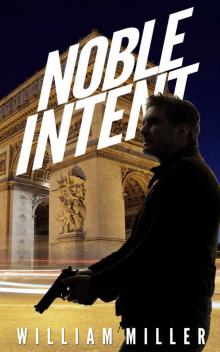 Noble Intent
Noble Intent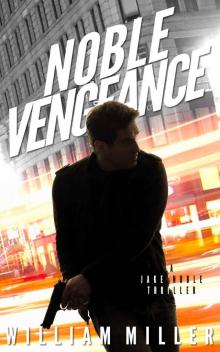 Noble Vengeance
Noble Vengeance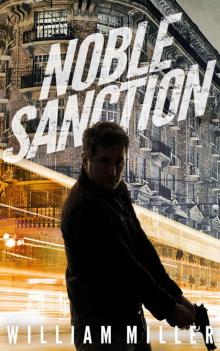 Noble Sanction
Noble Sanction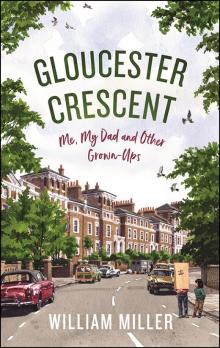 Gloucester Crescent
Gloucester Crescent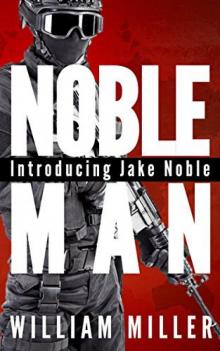 Noble Man
Noble Man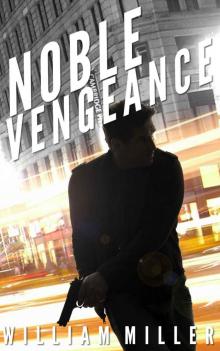 Noble Vengeance (Jake Noble Series Book 2)
Noble Vengeance (Jake Noble Series Book 2)